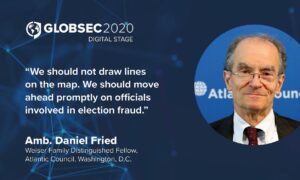A High-Stakes Standoff in Belarus https://t.co/MJZpJ8bbQg
— Democracy Digest (@demdigest) September 2, 2020
A senior U.S. official said the United States and European Union were closely coordinating to find a way that avoids overt Russian intervention in Belarus and opens “space” for a dialogue between the opposition and President Alexander Lukashenko on transitioning from his rule. “We are not looking to impose a solution or suggest that we need to have a seat at the table,” the official said on condition of anonymity, Reuters reports:
 Washington wants a way to bolster democracy in Belarus that avoids Russian intervention, something which – as U.S. Deputy Secretary of State Stephen Biegun told Russian officials last week in Moscow – would further damage U.S.-Russian ties. ….
Washington wants a way to bolster democracy in Belarus that avoids Russian intervention, something which – as U.S. Deputy Secretary of State Stephen Biegun told Russian officials last week in Moscow – would further damage U.S.-Russian ties. ….
“This is not a contest between East and West, and certainly not a contest between Russia and the United States,” he said on Friday, calling for violence against protesters to stop, those “unjustly detained” to be freed and “a truly free and fair election under independent observation.” Experts said Biegun has an uphill climb.
“He has to work in the face of a lot of friction and unnecessary tension in U.S.-European relations and in the face of President Trump’s own apparent ambivalence about supporting democracy,” said NED board member Dan Fried (above), the former top U.S. diplomat for Europe who is now at the Atlantic Council think tank.
![]() So far, the Belarusian opposition has been very careful to avoid compromising its movement for democracy and national self-determination by taking sides in the geopolitical competition between Russia and the West, adds Carl Gershman, President of the National Endowment for Democracy. As opposition leader Sviatlana Tsikhanouskaya has said, the revolution is “neither pro-Russian nor anti-Russian, nor is it anti-European or pro-European,” he writes for the ACUS Belarus Alert:
So far, the Belarusian opposition has been very careful to avoid compromising its movement for democracy and national self-determination by taking sides in the geopolitical competition between Russia and the West, adds Carl Gershman, President of the National Endowment for Democracy. As opposition leader Sviatlana Tsikhanouskaya has said, the revolution is “neither pro-Russian nor anti-Russian, nor is it anti-European or pro-European,” he writes for the ACUS Belarus Alert:
It is essentially a national revival that has carefully avoided challenging Moscow because opposition leaders are fully aware not only of the political danger of such a move, but of the impossibility in the short run of disengaging Belarus from its dense economic ties to Russia. But as Anders Aslund has noted, if Belarus can break free of Lukashenka’s iron grip and start a process of democratic transition, it has an excellent opportunity, with its educated population, to build a new market economy that could gradually become more integrated into European and global economies.
Analysts András Rácz, Cristina Gherasimov, Milan Nič, outline Four Scenarios for the Crisis in Belarus for DGAP, while European Council on Foreign Relations expert Gustav Gressel describes The slow dismantling of the Belarusian state.
Putin and the Belarusian Question https://t.co/ZcG2vZJMqx
— Democracy Digest (@demdigest) September 2, 2020







